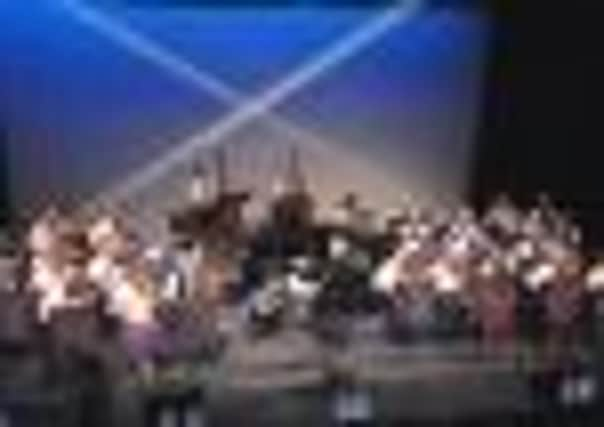Iain Gray: Music changes the world one note at a time


The other day, a flyer crossed my desk advertising a drama workshop against austerity and the cuts. In the eighties, when I lived and worked in Wester Hailes and West Pilton, there was a vogue for workshops in circus skills for the poor and oppressed. Community workers seemed sure that the route out of poverty was best traversed on a unicycle. This kind of thing was not unique to the poorer parts of Edinburgh.
The author John O’Farrell grew up as the son of the only “lefty” family in a Berkshire suburb. His autobiography describes a revelation during a sparsely-attended “die-in”. As he lay, pointlessly pretending to be the victim of a nuclear strike, it came to Farrell in a flash of insight that “nuclear weapons would never be defeated by face painting alone”. Poverty will not be eradicated by juggling, stiltwalking or fire-eating either.
Advertisement
Hide AdAdvertisement
Hide AdYet, when it comes to music I am convinced of its transformative power. All three of my daughters had the opportunity to learn an instrument at school and to participate in bands and orchestras. Two of them went on to the Edinburgh Schools orchestras, and although only one of them still plays – and teaches – it enriches the lives of all three.
Everyone should get that chance, which is why when we cut unaffordable promises from Labour’s manifesto for last year’s Scottish Parliament election, I insisted on protecting, and expanding, commitments to free instrument tuition in schools. The Youth Music Initiative, introduced in 2003 by Jack McConnell, guaranteed that opportunity for all children by Primary 6. To their credit, SNP governments have continued it.
Locally though, opportunities for children to keep learning an instrument throughout schooling have not been maintained. The EIS recently revealed that only eight local authorities provide free tuition through school, and some charge for those who are studying Standard or Higher Grade music. Those which do charge have also increased fees, with Aberdeen the most expensive of Scotland’s councils.
You can see how music enriches lives in countless families like mine, but its power to transform a whole community, even society itself is another thing altogether.
For that you need to go to the Raploch estate in Stirling, the city’s most deprived area. Or in my case to Holyrood in October 2010 when the Big Noise came from Raploch to the parliament’s garden lobby to perform. The Big Noise is an orchestra project for children established by Sistema Scotland in Raploch in 2008.
This is not a music project, it is a social programme and it aims not simply to involve enough players to recruit an orchestra, but to engage a high enough proportion of all children to create a better community. The idea comes from Venezuela, where Jose Antonio Abreu launched Social Action for Music 35 years ago as an alternative to drugs and crime for the children of the slums.
Now known as El Sistema and running throughout Venezuela, the programme remains true to Abreu’s vision, which he summed up as “an agent of social development, in the highest sense because it transmits the highest values – solidarity, harmony, mutual compassion. And it has the ability to unite an entire community.”
The difference between this and music tuition generally is the engagement of as many as 85 per cent of the children in the community, the intensity of involvement, with three rehearsal nights a week and every day in school holidays, and the degree of support provided by tutors to individuals not just to learn but to participate. Tuition and instrument loan are free and participation starts with children of nursery age. Combining with others in the structure of an orchestra encourages self-discipline, confidence, self-esteem and mutual respect.
Advertisement
Hide AdAdvertisement
Hide AdThat is transformative, as was evident that evening in Holyrood. You could hear it in the Big Noise ensemble’s performance of an arrangement of Beethoven’s Ode to Joy. You could feel it from the mother I met, bursting with pride at her daughter’s performance, and confiding that she had been inspired to start to learn the cello herself. You could see it in the face of Nicola Benedetti, Scotland’s foremost concert violinist, and “big sister” to the performers, relegated to the audience for once and clearly delighted to be so.
The parliament was a perfect setting because it was created to transform Scotland for the better. Those values Abreu championed are the very values our parliament should pursue. To see them made real, right there in the heart of our democracy, by those youngsters playing perhaps the most sublime music yet written was a lesson in what is possible.
Even in these tough times, in fact because of these tough times, parliament should be ensuring that Big Noises strike up in other communities. Jenny Marra MSP is campaigning for El Sistema to set up in Dundee, asking the council to provide seed funding to lever in other support. Sistema Scotland is in discussion with other communities, too, and I hope that it receive a positive response. The Scottish Government could help with a little more funding. Perhaps it will. I hope so.
On midsummer night, the Simon Bolivar Orchestra of Venezeula, many of whom graduated from El Sistema, will perform the opening concert of the London 2012 Festival – in the Raploch. The Big Noise Orchestra of Raploch will make a special guest appearance. Deprivation will not be defeated by music alone. But something magical is happening in Raploch and not just for midsummer.
• Iain Gray is Labour MSP for East Lothian